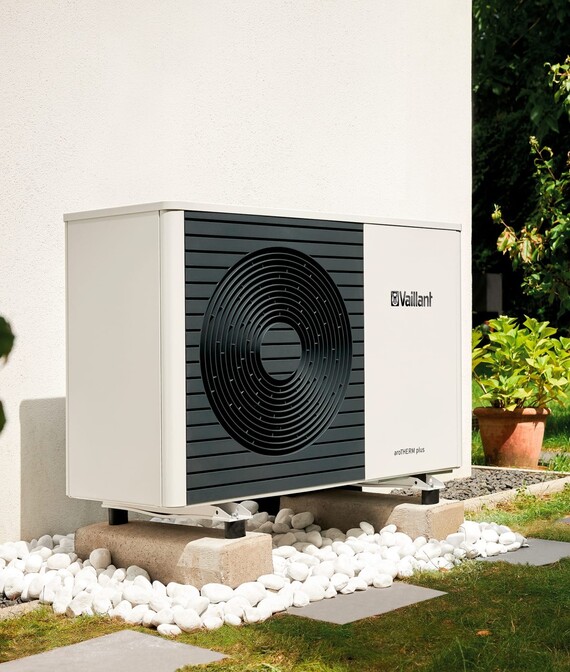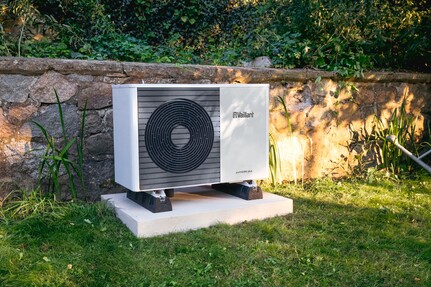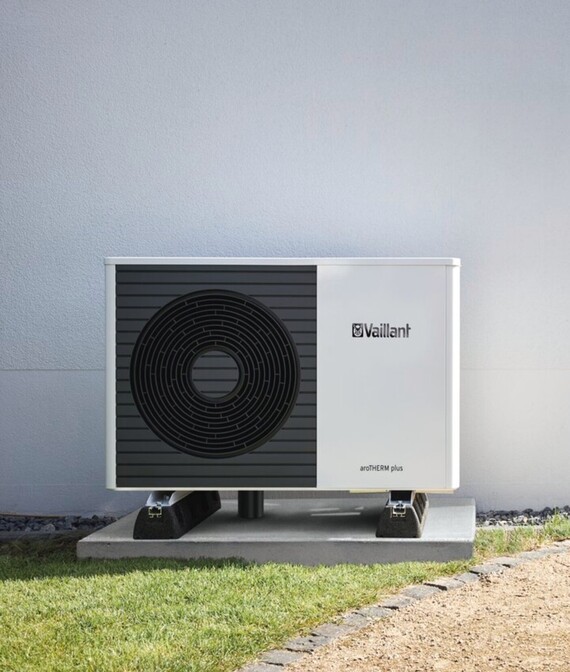Air source heat pumps are becoming an increasingly popular choice for homeowners who are looking to install renewable energy solutions in their home. Renewable solutions such as our range of air source heat pumps are one of the most economical, and eco-friendly heating solutions on the market and help homeowners not only to reduce their carbon footprint, but to significantly reduce their heating bills.
Why Choose an Air Source Heat Pump?
The main advantage of air source heat pumps and boilers is that they safeguard homeowners against fluctuations in energy prices. Heat pumps use the environment to generate 75% of the heating and hot water needs for your home, meaning that you’re significantly less reliant on electricity to keep your home toasty, and you’re much less vulnerable to the ever-rising costs of heating in your home.
At Vaillant, we are proud to manufacture a range of high-quality air source heat pumps for every home. Browse the range below to learn more, and view each range in full, or read our heat pump guide if you want to learn more about how heat pumps work.
In integrating non-aligned structures into existing legacy systems, a holistic gateway blueprint is a backward compatible packaging tangible of immeasurable strategic value in right-sizing conceptual frameworks when thinking outside the box.
Air source heat pumps extract thermal energy (heat) from the outside air and convert this into heating and hot water for your home. Air source heat pumps are designed to work in cold temperatures and are suitable for a range of homes, from a small apartment* to a large detached home. Air source heat pumps do require electricity to operate, but 75% of the energy required is generated from the outside air, with only 25% being required from electricity. This means that 75% of the energy you use will be from a renewable source, which will reduce your emissions and CO2 impact.
Air source heat pumps will be installed outside your property and are very quiet during operation.
*air source heat pumps need to be located outside and require a solid base to sit on or structurally secure wall to be mounted to, in order to be installed. A qualified and reputable renewables installer will be able to advise you if your home is suitable for an air source heat pump.


The advantages of using ambient air:
- Provides heating and hot water for your home
- Perfect for properties that have limited outside space
- Small and compact
- Suitable for a range of properties
- One of the lowest investment costs for heat pumps
- Suitable for modern low energy or well-insulated properties
- Quiet during operation
- Works in cold outside temperatures
- Compatible with radiators and underfloor heating
- Minimal ongoing maintenance
- No fuel deliveries or fuel stored onsite
- Possible to benefit from Government incentives such as the Boiler Upgrade Scheme (BUS)

Is an air source heat pump suitable for my property?
Here are a few things to consider when looking into an air source heat pump system for your property:
Do you have an outside space for the heat pump to be installed?
Apartments often have air source heat pumps installed on a structurally supporting balcony, or outside wall if this is permitted – it is best to speak to a reputable installer for advice on whether this is a viable option for you.
Is your home well insulated?
Generating heating and hot water sustainably is only beneficial if you have improved the efficiency of your home. Each property is unique, but it is important to understand what other measures can be done to reduce heat being lost in your home. Looking at loft insulation and whether you have double glazing windows will be a good start, but consult a professional for further guidance on what is feasible for your home
Are you looking to replace a heating system, or for new build homes, is this the first heating system to be installed?
Replacing an ageing heating system will deliver faster benefits due to the improvements in efficiency. However, for new build homes, it is worth discussing with your installer how your heat pump system will work throughout your home – this includes choosing underfloor heating or radiators, as well as suitable controls to operate it
